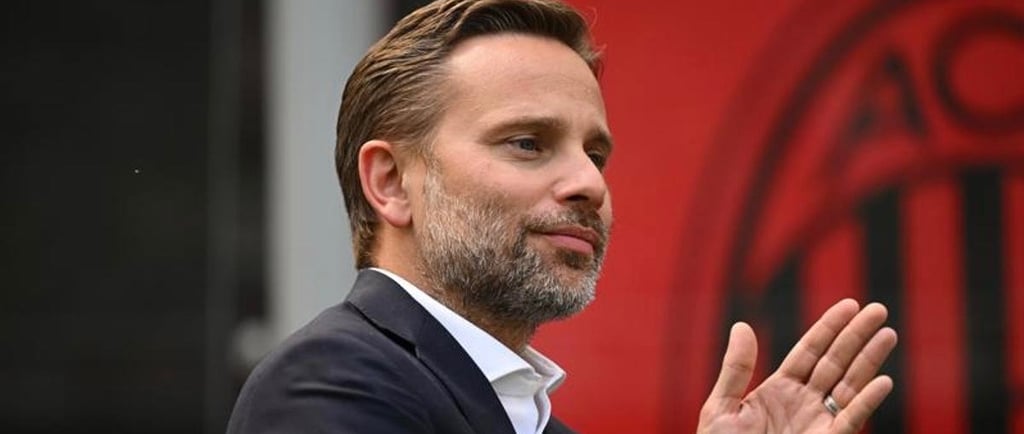"NON ABBIAMO NECESSITÀ DI VENDERE". 10 GIORNI DOPO, CEDUTO REIJNDERS.
NEWS


4 giugno 2025
"Oggi finisce la stagione e da domani si ricomincia. Offerte per Reijnders? Focalizziamoci su cosa fare per rafforzare e non sulle cessioni perché sono stati fatti degli errori e dobbiamo migliorare. Non ci sarà necessità di fare sacrifici sul mercato, anche senza le coppe".
Era il prepartita di Milan Monza, ultima partita di quella che è stata una delle più fallimentari stagioni della storia del Club. A parlare allora era stato l'amministratore delegato Giorgio Furlani.
Appena 10 giorni dopo, il Milan si ritrova a salutare Tijjani Reijnders, gioiellino del centrocampo rossonero, per una cifra attorno ai 70 Milioni. I rossoneri registrano cosi una plusvalenza di poco meno di 50 milioni, ma si privano di quello che è stato non solo il miglior giocatore della stagione, ma anche di colui che è stato votato il miglior centrocampista della Serie A per il Campionato appena concluso.
Se ne privano per una cifra che, secondo il parere di chi vi sta scrivendo, è assolutamente insufficiente. Insufficiente per diversi aspetti: per la "Non necessità di fare sacrifici sul mercato", per le disponibilità economiche della squadra a cui lo stai vendendo, ma soprattutto per i valori che ha raggiunto oramai il mercato dei giocatori in Europa.
Senza andare a cercare esempi esotici in giro per il Continente infatti, basti pensare a come Reijnders frutterà al Milan meno di quanto fruttò Onana all’Inter. Meno di un portiere che oggi occupa le pagine di cronaca sportiva quasi esclusivamente per i suoi errori e le sue disattenzioni tra i pali, ma che i cugini nerazzurri sono riusciti a vendere, dopo una sola stagione, registrando in quel caso una plusvalenza monstre di oltre 55 milioni.
Il Manchester City ha voluto fortemente il giocatore, spingendo per chiudere l’operazione prima del Mondiale per Club, al via tra circa dieci giorni negli Stati Uniti. Il Milan, invece, si è affrettato a vendere, pur essendo perfettamente a conoscenza dell’interesse concreto degli inglesi. Ancora una volta il club rossonero non è riuscito a strappare quella che da molti era considerata la tanto attesa “offerta irrinunciabile”, mancando l’occasione di fare leva sulla fretta e sulle enormi disponibilità economiche di una società che, a differenza della nostra, ha liquidità da investire e la volontà di farlo.
Nel mentre, la dirigenza rossonera tratta per cedere in fretta e furia anche Theo Hernandez e Mike Maignan, con quest'ultimo messo alla porta con la sola colpa di non aver gradito la brusca virata sul rinnovo del suo contratto. Virata avvenuta per mano della stessa proprietà.
Il tutto con la buona pace del "Non ci saranno da fare sacrifici".
E no, non basta Modric a 40 anni per rabbonire il tifo.
EN VERSION
"Today the season ends, and tomorrow we start again. Offers for Reijnders? Let’s focus on how to strengthen the team, not on sales, because mistakes were made and we need to improve. There will be no need to make sacrifices in the transfer market, even without European competitions."
These were the words of Milan CEO Giorgio Furlani in the pre-match interview before Milan vs. Monza — the final game of what turned out to be one of the most disappointing seasons in the Club’s history.
Just ten days later, Milan finds itself saying goodbye to Tijjani Reijnders, the midfield gem, for a fee of around €70 million. The club secures a capital gain of just under €50 million, but parts ways with not only its best player of the season, but also the one who was voted Serie A’s best midfielder for the recently concluded campaign.
And they do so for a fee that, in the opinion of this writer, is far from sufficient. Insufficient for several reasons: for a club that claimed there would be “no need to make sacrifices in the transfer market,” for the financial resources of the buying club, but above all for the current market values of players in European football.
Without even needing to look for obscure examples across the continent, just consider how Reijnders will bring in less money for Milan than Onana did for Inter. Less than a goalkeeper who now makes headlines mostly for his mistakes and lapses in concentration, but whom Inter’s management managed to sell after just one season, cashing in on a massive capital gain of over €55 million.
Manchester City were determined to sign the player, pushing to finalize the deal before the Club World Cup kicks off in around ten days in the United States. Milan, on the other hand, rushed to sell, despite being fully aware of City’s strong interest. Once again, the Rossoneri failed to secure what many had labeled a so-called “irresistible offer,” missing the chance to capitalize on the urgency and the deep pockets of a club that, unlike ours, has liquidity — and the willingness to spend it.
Meanwhile, the Milan front office is hastily working to offload both Theo Hernandez and Mike Maignan, with the latter effectively shown the door after expressing discontent over a sudden change of course in his contract renewal — a change initiated by the club’s ownership itself.
All of this, in complete contradiction to the promise that “there will be no need to make sacrifices.”
